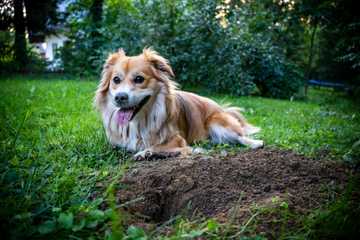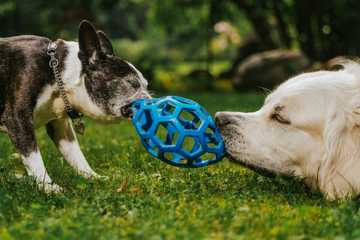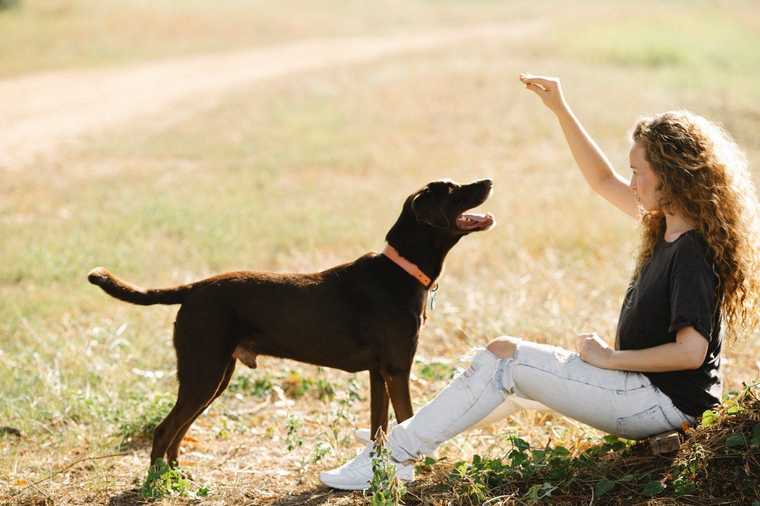Why Do Dogs Dig and How to Stop Digging Dog?

Curiosity, playfulness, and sometimes, just a bit of mischief – dogs have many reasons for digging up your yard! This article will explore the fascinating world of your pup's digging habits.
We'll uncover the "whys" behind such adventures and equip you with friendly, practical training techniques on how to get a dog to stop digging.
Why Do Dogs Dig Holes in the Yard?
Why do puppies dig holes? And why do adult dogs adopt such behavior? There is no universal reason for a sudden love of destroying your yard. To some extent, digging holes can be explained by your pet’s genetic makeup. In some cases, the environment plays a more significant role.
- Breed:
Some breeds have a more prominent prey dive. They have a natural inclination to look for small animals in the ground. Terriers, hounds, and dachshunds are often guilty of this behavior.
- Boredom:
When dogs are bored, they may dig to find stimulation. They might even dig under the fence, create holes in your beautiful backyard to entertain themselves, and dig when you leave them home alone without much to do (but make sure it’s not due to separation anxiety).
- Lack of supervision in puppies:
If you catch them digging, you can discourage the behavior (by redirecting them to a toy or a designated place where they’re allowed to do so). If you start this practice with a puppy, it's less likely they'll develop a habit as they grow older.

- Burying items they want to hide:
They do what comes naturally. The best you can do here is to always supervise your dog (if you can’t supervise your pooch directly, you should manage their surroundings to prevent the behavior, e.g., by putting vinegar in the holes, providing lots of toys and chewing options, etc.).
- Looking for comfort:
Dogs may dig around their beds to make them more comfortable to lie down on or make holes in the ground to cool down in hot weather.
- Anxiety:
Such disruptive behavior can also be caused by separation anxiety in dogs. If your furry friend starts whining, pacing, or panting when you're about to leave, they might resort to digging as a way to cope with anxiety.

How to Prevent Dogs from Digging?
The love for digging can manifest as occasional attempts to dig a hole in your yard. If this behavior doesn’t occur often, ignoring it is a valid option since it tends to resolve independently. However, some dogs become too enthusiastic and make the habit disruptive.
If the latter is your case, you might be interested to learn more about possible ways to keep dogs from digging.
Keep the area out of reach
If there is a specific area where your dog prefers to dig, start by limiting their access to it. You can put a fence or some other kind of construction to make it a restricted area. Another option is supervising your dog until the problem goes away.

Provide enough mental stimulation
While most dog owners recognize the importance of physical exercises, many overlook their need for mental stimulation. Keep their mind busy with daily walks outside, playing games, doing puzzles, and other stimulating activities.
Allocate a special area or sand pit
Digging is a typical instinctive behavior for canines. A dog digging in the yard stops being a problem once you create a designated digging area for your furry companion. Set up a sand pit where you can hide their favorite toys and encourage the dog to dig them up. Such a simple trick will satisfy their desire to dig, provide mental and physical exercise, and keep your flowerbeds safe.
Train basic obedience commands
Stopping dogs from digging is easier if you introduce them to obedience commands. You can use a reliable recall and a nose touch to make your dog stop the behavior and redirect them to another activity. A drop-off cue is also effective when you must encourage releasing a dangerous object from the mouth.
How to Stop Digging Out of Boredom?
Now, let’s discuss how to teach a dog not to dig out of boredom. Apart from the steps mentioned above, you can fight it in other ways. If your pooch just enjoys creating new ways out under the fence line or destroying your yard when you’re not watching, here’s what you can do:
- Regular exercise:
Ensure your pooch gets enough physical activity through daily walks, playtime, and other forms of exercise. A tired dog is less likely to dig out of boredom.
- Teach the “Off” command:
When you catch your dog digging, you can use the “Off” cue and/or ask them to bring you a tug toy to play with. If they stop the behavior, remember to reinforce positive habits by playing the favorite game so they will likely choose this way next time!
- Rotate toys:
Introduce new toys regularly to keep your dog interested. This prevents boredom and reduces the likelihood of destructive dog's behaviors.
- Interactive feeders:
Use food-dispensing toys or puzzles to make mealtime more engaging. This not only provides mental stimulation but also keeps your dog occupied.
- Quality time:
Spend quality time with your companion through bonding activities, cuddles, and positive reinforcement. A strong bond with you can prevent undesirable behaviors.

How to Make Dogs Stop Digging for Comfort?
If you don’t have a cool room, your pet may start digging to decrease their body temperature. Try a pool in the yard or a shaded area, or schedule outdoor activities during cooler parts of the day.
If a dog scratches their bed, they try to make it more comfortable. As a solution, you can place a blanket on it or even change it for a more cozy one to ensure your pet is happy with their sleeping area.
How to Train a Dog Not to Dig: Dos and Don’ts
Let's quickly review how to teach a dog not to dig with the following dos and don'ts.
- Do mark “no” and remove them from the area
This may create fear or anxiety, worsening the behavior. Instead, redirect their attention to something appropriate and treat them when they do the right thing.
- Avoid unsupervised time in the yard:
If you head indoors, bring your dog along. If they must stay in the yard, provide mental toys with treats to keep them engaged.

- Don't ignore boredom:
Make sure your dog has enough physical exercise and playtime both when you’re at home and when they’re home alone.
- Don't give up on training:
Consistency is key. Don't give up if progress is slow; training takes time, and patience is crucial for modifying behavior.
Frequently Asked Questions
Why do dogs dig holes under a fence?
There are multiple reasons why dogs start digging under a fence. They’re usually trying to escape the area because they’re bored or don’t feel safe. Due to their hunting instinct, some canines create holes under a fence to chase other animals.
Why do dogs dig holes and lay in them?
This is a common technique used to cool their bodies down. That way, they can decrease their body temperature if no other option exists. If being hot causes your furry friend to dig, provide them with another sheltered place to relax and cool down.
What will stop dogs from digging?
The most effective methods include supervising dogs, restraining them from the area, providing sufficient mental stimulation, and offering a safe alternative to the behavior.

Passionate team dedicated to help pet owners raise safe and obedient dogs, fostering meaningful connections with their furry companions.

Certified dog trainer, exclusive positive reinforcement methods & tackling aggression problems.